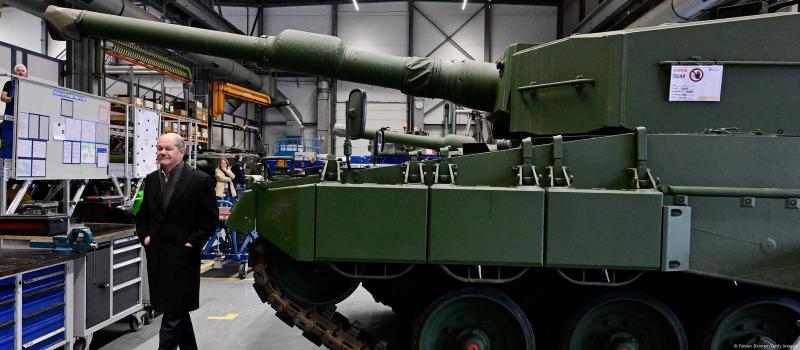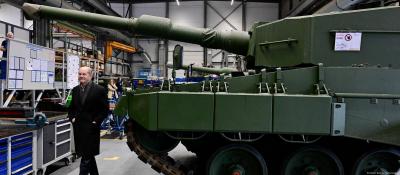"Finding mysterious holes in the walls of a military base"... "Alleged plot to assassinate the CEO of Rheinmetall, Germany's largest weapons manufacturer"... "Scandal of spying on the army"... All these matters are not taken from a spy novel dating back to the 1960s, but rather real events that occurred in Germany this year. While Moscow cannot be solely blamed for all these incidents, Germany is in a state of high alert in anticipation of potential Russian sabotage due to Berlin's ongoing military support for Kyiv in its war with Moscow.
As the fierce war between Russia and Ukraine intensifies, there are fears of Europe slipping into a new Cold War, according to the BBC. Mark Galeotti, a fellow at the Royal United Services Institute (a research center focused on defense and security based in London), states: "When we think of the Cold War, we tend to think of the 1970s, when the rules of the game became clear... In some ways, we are now in the early Cold War (the 1950s and 1960s), making this a much more difficult period."
But what would a renewed Cold War look like for the largest economy in Europe, a country that was once divided in two by the Iron Curtain? The most significant crisis occurred last month when CNN reported that American officials informed Berlin of an alleged Russian plot to kill the CEO of Rheinmetall, Germany’s largest weapons company. The Kremlin denied the report, but German Foreign Minister Annalena Baerbock criticized Russia for "waging a hybrid aggressive war."
Rheinmetall produces artillery shells and military vehicles for Ukraine, and if the assassination plot against its 61-year-old CEO, Armin Papperger, had succeeded, it would have triggered "waves of shock" in the Western world, according to the BBC. Shortly before this, a security lapse allowed spies to eavesdrop on a highly sensitive conversation between senior officials of the German Air Force, which was later broadcast on Russian television, causing significant embarrassment for Berlin. These events have raised accusations that Germany has "long been a weak link" in the European counter-espionage landscape.
Weeks after the spying incident, two Russian-German citizens were arrested on suspicion of plotting to sabotage U.S. military facilities in Bavaria. Baerbock summoned the Russian ambassador to complain, stating: "We will not allow Putin to bring his terrorism to Germany." Last week, holes were found in the walls of water facilities supplying two military bases in North Rhine-Westphalia, raising concerns that someone is attempting to contaminate the supplies.
Germany is not the only European country targeted by clear acts of sabotage, but it is the nation that hosts many U.S. military bases established after World War II. Mark Galeotti believes that Moscow views Germany as a significant but "flabby" power, making it an ideal pressure point.
On the other hand, the most notable act of sabotage affecting Germany in recent years was the "Nord Stream gas pipeline explosion," which runs under the Baltic Sea from Russia, in 2022. Speculations about who ordered the attack have proliferated since, but in an intriguing development, Germany issued an arrest warrant for a Ukrainian dive instructor. Last week, The Wall Street Journal reported that the "limited" operation was funded privately but supervised from Ukraine; Kyiv rejected the report, calling it "nonsense."
The fact that Ukrainian figures are now in the spotlight due to the "Nord Stream" explosions has sparked fresh criticism from familiar political factions within Germany regarding government support for Kyiv. Alice Weidel, co-leader of the far-right Alternative for Germany party, called for an end to "aid payments" to Kyiv and to "hold" Ukraine accountable for the damages to the Nord Stream project.
Thus, while the specter of the Cold War hovers over the European continent, the policies of that era have also resurfaced in Germany in a striking and unexpected manner. In an effort to bolster security, the German government is working on new legislation aimed at enhancing the resilience of critical infrastructure. German Interior Minister Nancy Faeser stated that there must be "the utmost protection measures in all areas." Furthermore, there are also "controversial" plans for the United States to deploy long-range missiles in Germany starting in 2026.
When the Russian full-scale invasion of Ukraine began, Chancellor Olaf Scholz promised a turning point in Germany's national defense and security policy. However, both supporters and critics of the government acknowledge that reversing years of underinvestment in defense will take time, as will adjusting a mindset heavily influenced by Germany's military past. Mark Galeotti notes that this is not just about rebuilding defense but also improving cybersecurity and counter-intelligence, adding: "Security planning does not happen over weeks or months, but over years."




